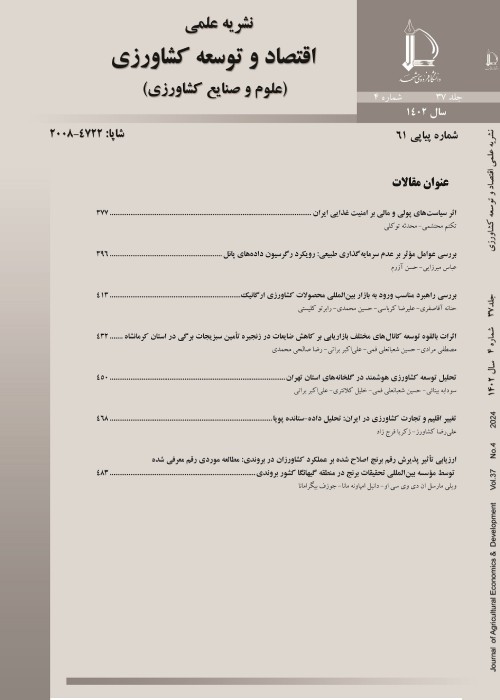Impacts of Climate Change and Water Scarcity on Farmers' Irrigation Decisions in North-Khorasan Province: Major Crops
This paper evaluates the effect of water scarcity and climatic conditions on farmers' irrigation decisions in the production of major crops including wheat, barley, cotton, sugar beet, and alfalfa in North-Khorasan province. Farmers’ irrigation decisions are defined with a management model composed of equations of the share of irrigated land, technology adoption, and the irrigation frequencies, which investigated the effect of water scarcity indicators and climatic factors, farm water supply method, land characteristics, and farmers’ demographic features. For this purpose, the required data were collected from the 380 questionnaires, completed by farmers in cultivation year of 2017-2018. Then, the equations of the management model were estimated using fractional logit, binomial logit, and OLS methods. The results indicated that economic and physical scarcity of water resources, climatic conditions of temperature and precipitation, severe events of frost and heat, and drought have noticeable impact on farmers’ irrigation decisions. Farmers try to reduce the damage caused by climate change and water scarcity by deciding to irrigate their farms and adopting new irrigation technologies. Also, the type of water sources, i.e. surface and groundwater, irrigation method, soil quality of cultivated land, and land size have significant effects on their decisions. In regions without available surface water resource, the cultivation areas of irrigated land are declined. Also, due to water scarcity, farmers are more willing to invest on new technologies to improve irrigation efficiency. In the farms with higher soil quality, improved cropland direction and slope, and resource availability, farmers are more willing to invest on new irrigation methods and increase irrigation frequencies. Therefore, the implementation of policies on improving land quality and cropland integration can increase the acceptance of new technologies, and reduce the water usage. In addition, farmers’ demographic characteristics such as experience, tenure, and education influence their decisions for irrigation. Creating suitable conditions for the education and training of farmers will increase farmers’ awareness of new agricultural methods and the importance of water resources. Findings of this study provide vision on – how of farmers reaction against crop production systems as well as mitigation policies to confront climate change impacts.
- حق عضویت دریافتی صرف حمایت از نشریات عضو و نگهداری، تکمیل و توسعه مگیران میشود.
- پرداخت حق اشتراک و دانلود مقالات اجازه بازنشر آن در سایر رسانههای چاپی و دیجیتال را به کاربر نمیدهد.


